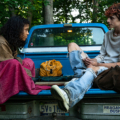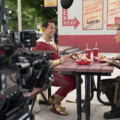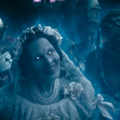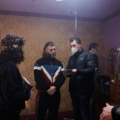Set several generations in the future following Caesar’s reign, Kingdom of the Planet of the Apes is the latest Planet of the Apes movies and sees apes has the dominant species living harmoniously, while humans have been reduced to living in the shadows.
The movie follows Noa (Owen Teague), a young ape whose life is ripped apart by the new ape leader Proximus (Kevin Durand). Establishing an uneasy alliance with a young human Mae (Freya Allan), the two journey to
Proximus’ stronghold and will define a future for apes and humans alike.
The movie is a whole new fresh take on the Apes franchise and we sat down with its director Wes Ball to find out more…
This movie takes place hundreds of years after the events of War for the Planet of the Apes. How would you describe this world that we find ourselves in in Kingdom of the Planet of the Apes?
I would say it’s a new beginning. Those previous movies are about the end of the human world for the most part and spoiler alert, it was the end of this character of Caesar. Because of this time jump that we get to make, we get to start over [and see] what has become of Caesar’s legacy – his myth, his legend, and how it has transformed. Ultimately, our main character, Noa, has very much grown up in this isolated existence, without much knowledge about the world around him or how it came to be. This adventure that he goes on is about him discovering all those things and how it’s going to shape him into the the ape he is going to become in the future… and hopefully in future movies if we get lucky enough to make them.
You’re no stranger to creating dystopian worlds after your work on Maze Runner. What was it like creating the world of Kingdom of the Planet of the Apes?
It’s a lot of fun. The thing that I was always really inspired by as a kid with the original Planet Of The Apes, the 1968 version, was the fact that it was on Earth, but almost all evidence of human existence was gone. It had eroded away through time. It was fun for us to think about how we weren’t quite there yet, but on our way to becoming that. Where whole buildings are starting to become overgrown and become almost just mountains. I love that concept of how to show how our existence, our world that we’re so familiar with, was slowly disappearing, and along with it, all its secrets and all its knowledge. That was a fun thing for us to play around with visually and obviously it serves well for the story itself as Noa learns about these secrets and all the things that have been lost to time.

Speaking on the 1968 movie… what do you think it is about this story that keeps audiences coming back for more?
I think people could write whole giant papers on this topic! I think it’s a couple of things. I think there’s an element of; good sci-fi always holds up a mirror to ourselves, and the times that we live in. It’s always somehow making a comment on issues – it’s thought-provoking in that way.
Also, there’s a spectacle aspect of it all. One of the big aspects of the 1968 film (while being a fantastic story and a commentary on the time at that moment), was it had the greatest makeup effects that had ever been done. Now here we are in this new reboot that started happening in 2011, where we’re using the greatest visual effects that have ever been done. So we’re still following in those footsteps of trying to push the boundaries on the spectacle but also trying to hold true to that concept of the science fiction aspect of it all, and having conversations about ideas.
What do you think it is about genre movies specifically that makes them a good platform for holding up mirrors to society?
I think there’s an aspect of because they’re apes and because we’re asking us to almost see ourselves in them, the fact they’re wearing these masks almost, that we could almost judge ourselves more freely in a weird way.
Because we do see them as sort of the human characters in this movie. They’re like us, and sometimes they’re making the same mistakes as us. It’s very interesting how this franchise has endured for so long. It’s cool.

What are you looking forward to audiences seeing when they sit down to watch Kingdom of the Planet of the Apes?
Oh it’s all gonna be fun! We spent a lot of time crafting these worlds, these characters, these places and these adventures that they go on. I hope people go to see it and appreciate just the level of artistry alone that was deployed on this thing. They’re very hard movies to make but it’s also a lot of fun. I hope people really engage with these new characters in the story, and enjoy the journey that we take people on… and on the biggest screen possible, hopefully!
Kingdom of the Planet of the Apes is out in cinemas now.




